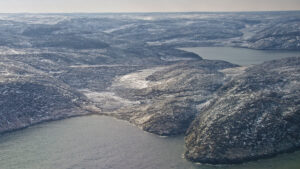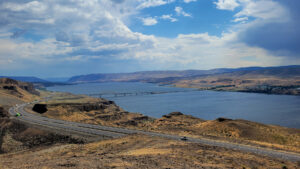By Tricia Stadnyk, University of Calgary
Rising temperatures, a melting Arctic and increasing global water and resource scarcity are behind President Donald Trump’s threats to make Canada the 51st American state.
A geopolitical storm is brewing in the Arctic, accelerated by climate change and a play for global domination of Arctic land, coastline and trade routes that provide access to massive reserves of critical minerals, oil, gas and water.
The second Trump administration is aware of both the new opportunities and risks as global temperatures shatter new records and thresholds, and an ice-free Arctic becomes a possibility.
Land resources
The Arctic is home to a wealth of critical minerals (called rare earth elements) that can withstand extreme cold and pressure changes, making them essential for the space industry, technology and green energy sectors.

China currently controls approximately 60% of the global market, but this past fall announced a ban on exports to the U.S. in retaliation for U.S.-imposed trade restrictions.
Significant reserves of critical minerals exist in Canada and Greenland, explaining Trump’s desire to tap into their lucrative resources. And it’s not just minerals, but massive reserves of oil and gas, both onshore and offshore, are attracting U.S. interest.
Current political tensions between Greenland and Denmark, with Denmark acknowledging its own neglect, mean the timing couldn’t be better for brokering a new U.S.-Greenland partnership.
Sea resources
The U.S. Department of Defense tabled a new Arctic Security Strategy last summer in light of increasing security threats associated with the opening of the Northern Sea Route and Northwest Passage.
Rights and control over the Northwest Passage remain contested by the European Union and U.S., who rebuke Canada’s claim to the route.
If the U.S. claimed the Northwest Passage and the Panama Canal, it would control both major sea routes accessing North America and would represent a significant power grab. Controlling the passage requires a military and strategic presence within the Arctic, which has historically been dominated by Russia.
Canada controls one-third of the Arctic coastline and 25 per cent of the territory, second only to Russia. Climate change is opening passageways — disconnecting land from ice — and creating the potential for land and resource claims that Canada will be forced to defend.
Water resources
Canada is perhaps the least prepared to defend threats to water security due to the absence of a national policy or framework over water governance.
Experts have warned against Canada’s vulnerability to American interests since at least the 1970s. Trump has already highlighted the “very large faucet” controlling “millions of gallons of water pouring down from the north, with the snow caps and Canada.”

He is referring to the Columbia River flowing between British Columbia and Washington and Oregon states, the fourth largest river in the U.S. by volume. The Columbia originates in Canada at the Columbia icefield on the B.C.-Alberta border in the Rockies, but 85 per cent of the basin is in U.S. territory.
The river is governed by a treaty originally ratified in 1964 that resulted in Canada losing control of its rights to divert water for upstream agriculture across the drying Prairie region.
The treaty has been under renegotiation for years to update the terms of water-sharing and controlling interest of both the U.S. and Canada, including new rights for Indigenous Peoples.
An agreement in principle was reached in December 2024 by the Justin Trudeau-Joe Biden administrations, but Trump’s second election has sparked concerns due to his expressed desire to divert water to drought-stricken and fire-plagued California. In his inauguration address, Trump falsely claimed the fires in Los Angeles were still burning “without a token defence.”
The Canada-U.S. agreement allows both nations to control water within their own jurisdictions to address their greatest needs — energy production and water supply. Need in the U.S. will always exceed Canada’s simply due to the disproportionate populations in each country.
Canadian vulnerability
Canada’s Transboundary Waters Protection Act deals with water-sharing and is governed by the International Joint Commission’s 1909 Boundary Waters Treaty.
And while Canada is the signatory, control and management of water in Canada falls to provincial and territorial governments. In the absence of a national water policy framework, Canada is vulnerable to foreign interests seeking to access, use and control waters crossing the 8,891-kilometre border between Canada and the U.S. in 13 river basins, including those in the Great Lakes.
Canada would be foolish to think this will stop at the Columbia River, particularly as climate change turns up the heat and fires rage across both Canada and the U.S., increasing the desire and competition for a finite supply of water.
Canadians must recognize that climate change is not only changing our landscape and lifestyle, but also exposing imminent threats to our national security and sovereignty. If they value their land and water — and Canadian identity — they must be prepared to respond collectively and decisively to the surging interest over Canada’s resource wealth.![]()
Tricia Stadnyk is a professor and Canada research chair in hydrological modelling in the Schulich School of Engineering at the University of Calgary.
This article is republished from The Conversation under a Creative Commons license. Read the original article. Banner photo: Ice in the Bellot Strait in 2010 (Ansgar Walk, CC BY-SA 3.0, via Wikimedia Commons).
Sign up for The Invading Sea newsletter by visiting here. To support The Invading Sea, click here to make a donation. If you are interested in submitting an opinion piece to The Invading Sea, email Editor Nathan Crabbe at nc*****@*au.edu.



